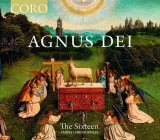Zwanzig Vertonungen des Gebetes ‘Lamm Gottes‘ bieten Chor und Orchester ‘The Sixteen‘ und sein Leiter Harry Christophers auf ihrer jüngsten Einspielung. Die Spanne der Werke reicht vom frühen 16. bis zum 20. Jahrhundert, von Thomas Tallis bzw. Christopher Tye bis zu Samuel Barber und Edmund Rubbra. Damit werden nicht nur verschiedene Zeiten, sondern auch verschiedene Stile angeboten.
Die demütige Bittschrift an das Lamm Gottes als Sinnbild für Reinheit, Unschuld und auch Hilflosigkeit findet in privaten Gebeten ebenso seinen Platz wie in Messen. Es ist aber seinem Charakter entsprechend eine eher eingekehrte und stille Bitte, die sich mit Bedacht und Sorgfalt äußert. Insofern durchzieht diese Sammlung eine Ausstrahlung der Kontemplation und Ruhe. Aus dieser Gleichmäßigkeit schöpft die Kollektion auch selbst Kraft.
Die Palette reicht von einstimmigen bis zu polyphonen Ausgestaltungen, die vom Chor in gewohnt souveräner Weise dargeboten werden. Dabei gelingt es, durch alle Werke hindurch die Spannung aufrecht zu erhalten, obwohl die Möglichkeiten der Gestaltung mangels größerer Temposchwankungen eingeengt sind. Aber stimmlich wissen sich die Choristen, von denen hier und da einige mit solistischen Partien glänzen können, mit gutem Gesang darzustellen, die den intimen Charakter der Gebete betonen.
Twenty settings of the prayer ‘Lamb of God’ are offered by choir and orchestra ‘The Sixteen’ and its director Harry Christophers on their latest recording. The works range from the early 16th to the 20th century, from Thomas Tallis or Christopher Tye to Samuel Barber and Edmund Rubbra. Thus, not only different periods but also different styles are offered.
The humble petition to the Lamb of God as a symbol of purity, innocence and also helplessness finds its place in private prayers as well as in masses. In keeping with its character, however, it is a more introspective and silent petition, expressed with deliberation and care. In this respect, an aura of contemplation and calm pervades this collection. The collection itself also draws strength from this evenness.
The palette of arrangements ranges from monophonic to polyphonic and is presented by the choir in its usual quality. It succeeds in maintaining the tension throughout all the works, although the possibilities for shaping are limited due to the lack of major tempo fluctuations. But vocally the choristers, some of whom can shine here and there with soloistic parts, know how to present themselves with brilliant singing that emphasizes the intimate character of the prayers.
























